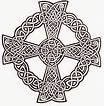Did you ever grab a book at the library thinking that this was the perfect book and then realize...ooops! I should have looked a bit closer? Yes....
I mentioned at the end of last week's blog that I was going to be going backwards instead of forwards this week. I wanted to find out more about what the Celtic religion was like before Christianity came along. The religion would properly be called Pagan. And the clerics were called druids. So it was three books on Druids that I grabbed at the local library before flying down to visit Dad. (I am writing this from Ontario.) And to take on the flight, I choose the one paperback from among the three, leaving the other two hard covered, heavier books at home. And when I opened the book here at Dad's...it was not backward 2,000 years that it wanted to take me, but right up to the modern time with an instruction guide on how to be a proper Druid today in the 21st century! Can you imagine my surprise? I didn't know there were Druids today and yet, here they could be walking amongst us!
21st Century Druid
A picture of a modern Druid. Ok, I could have selected many other pictures of men with long hair and beards or men and women dressed up in robes and strange clothing dancing around upright rocks like at Stonehenge, but one of the main points that Penny Billington was making is that a Druid of today should be unrecognizable from everyone else. They fit in!
And this is someone's idea of what an ancient Druid would look like.
Ancient Druid circa A Long Time Ago
So much for that book. I had to turn to the internet for more informed reading on what I actually wanted to find out this week. What you are going to get now...in a very short form (I hope)...is a summary of what I learned about Druids...the clerics from early Celtic religion. (Well, I learned more than this, but this is as much as will fit in a blog.)
A Druid was a member of the educated, professional class among the Celtic peoples of Gaul, Britain and Ireland, and possibly elsewhere during the Iron Age. The druid class included law-speakers, poets and doctors, among other learned professions, although the best known among the druids were the religious leaders.
Very little is known about the ancient druids. They left no written accounts of themselves, and the only evidence is a few descriptions left by Greek, Roman, and various scattered authors and artists, as well as stories created by later medieval Irish writers.
One of the few things that both the Greco-Roman and the vernacular Irish sources agree on about the druids is that they played an important part in pagan Celtic society. In his description, Julius Caesar claimed that they were one of the two most important social groups in the region (alongside the equites, or nobles) and were responsible for organizing worship and sacrifices, divination, and judicial procedure in Gaulish, British and Irish society (from Wikipedia).
One branch of the Druids were bards. These came from the poet variation and were singers, accompanying themselves on musical instruments. It is likely that these were the Druids responsible for passing along the traditions and history of the people. When Christianity came along to supplant Paganism in Celtic society, some authors believe that traveling monks took up some of the practices of the bards.
Druidic Bard
That is it for this week. There will be two more blogs coming in this series. The last two weeks of this sabbatical I am REALLY going to take seriously the part about relaxation and rejuvenation.
This coming week, I want to look at symbolism in Celtic history and Christianity. This is one of the areas that has become very popular in modern culture...especially in tattoo parlours. Celtic knots are the rage in everything from ink on skin to china plates. What does some of this symbolism mean?
The last blog will be a summary of what I have been thinking as I have looked at Celtic Christianity and the Celtic Spirituality movement of today.
Let's end with another Celtic prayer:
I arise today
Through a mighty strength:
God's power to guide me,
God's might to uphold me,
God's eyes to watch over me;
God's ear to hear me,
God's word to give me speech,
God's hand to guard me,
God's way to lie before me,
God's shield to shelter me,
God's host to secure me.
first millenium - bridgid of gael












